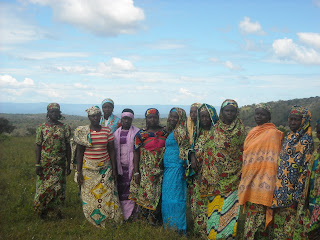As of late I have had bad luck with travel. Note-- I’m writing this during my 18th hour of sitting on the train. Sure it is the end of the rainy season and the roads, or trails, are wet, slippery, and hazardous. However, it seems like every time I travel I either take twice the amount of “normal travel time” (which is quite ambiguous) or get into an accident.
Three weeks ago, as my counterpart and I were trying to maneuver the poor, slippery trails en brousse, I was burned by a motorcycle muffler. This may seem like a trivial event, yet the lack of immediate medical care and my obstinacy that “nothing was wrong” (I was taking the advice of villagers that pus and liquid oozing down my legs and swollen lymph nodes was a common step to the healing process) compounded the incident and made me visit the hospital over 10 times. I ended up staying in Ngaoundere for nearly a week. Ironically, during first role in the Cameroonian hospital scene seen, I was cared for by Norwegian nurses and even an American Surgeon, in a Norwegian Lutheran funded hospital. It was a bizarre experience. Needless to say my short-sightedness about how easy infection can occur and the importance of cleaning wounds was a humbling experience.
Getting sick in rural Africa is a difficult endeavor that involves long-bureaucratic hospital visits (what? I have to go out of the hospital to buy my medicine, then come back to the hospital and pay, then go back to the nurses for them to take care of me with the medicine I bought???) and plenty of money that most Africans don’t have. I spent nearly 40 dollars on my visits. 40 dollars is just about what the average Cameroonian makes a month. Hence why most Cameroonians wait to the last minute to go to the hospital or to bring their kids to the hospital. They wait to the last minute for a cure, or a miracle, so they will not have to shell out their couple of months salary that they don’t have, or ask a far-flung relative for credit. Needless to say, this experience has made me greatly appreciate American hospitals, despite the increasing criticism they receive. If not for their cleanliness, I appreciate the explicit rules that are in place. I appreciate that no one (usually) cuts you in line to pay for your medicine at the Pharmacy. I appreciate that you have the opportunity to see a doctor. I appreciate that normally you don’t have to wait all day just to get a small wound cleaned.
Besides getting injured, life has been fine in Tourningal. The Good-byes have started. The guilt for leaving post has kicked in. It’s hard to explain to people that it’s not because of them that I’m leaving. I love Tourningal and I have loved my friends, “family” and work. It’s hard to leave a place when you are perfectly content and hard to describe to villagers that have never leaved why you would leave if you are happy. Despite the attenuation of work these last few weeks, I have managed to get a bit of work done; notably still meeting with Women’s Groups and holding a few ceremonies to distributePre-Natal Consulation Materials, such as scales and blood-pressure cuffs. The Ceremonies are memorable. Dozens of villagers, both male and female, congregate. Together we discuss the importance of allowing women’s groups to meet and sending pregnant women to the hospital to do pre-natal consultations. Now is the ultimate test; if the trained women are going to educate their respective community members and if the under-staffed health center staff is going to take the time to consult pregnant women en brousse during their monthly vaccination schedules. On va voir. I hope that the person who replaces me will continue to follow though with these projects. This is one of the ultimate problems with development—sustainability.
Well, hope this finds all healthy and happy in the US! Hope you are having nice autumns. There is no changing of foliage here in Cameroon (except green to dry).
Allah Hokku en Jam,
Ali or Amina
Tuesday, October 27, 2009
Monday, October 26, 2009
Friday, October 2, 2009
Subscribe to:
Posts (Atom)









